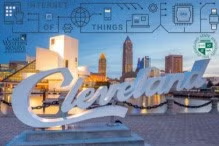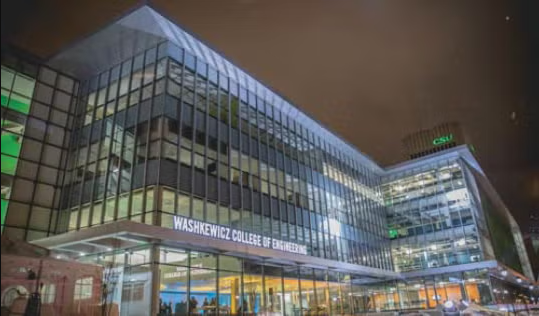Quantum Information Technology
Advancement and Research
Cleveland State University (CSU) is establishing its expertise in the exciting field of Quantum Computing in partnership with the Cleveland Innovation District (JobsOhio), CSU T.E.C.H. Hub and CSforCLE. CSU researchers across five departments, Electrical and Computer (ECE) Engineering, Computer Science (CS), Mathematics, Physics, and Information Systems, partner and collaborate with government and private industry, particularly the Cleveland Clinic, to develop and deliver innovative engineering solutions in Quantum Computing and Quantum Machine Learning as well as in Quantum Sensing and Quantum Error Correction, and Post-Quantum Cryptography (PQC).
CURRENT PARTNERS AND SUPPORTERS
- Partners
- CSU Faculty: Drs. Sathish Kumar (CS), Mehdi Rahmati (ECE), Janche Sang (CS), Chansu Yu (ECE), Federico Galetto (MATH), Gregory Lupton (MATH), Petru Fodor (PHY), Andrew Resnick (PHY), Kiril Streletky (PHY), and Charles McElroy (IS)
- Sponsors & Supporters: National Science Foundation (NSF), Ohio Department of Higher Education, Cleveland Clinic, and New America
Learn & Research

- Micro-credentials: Intro To Quantum Computing
- Drs. Sang, Galleto, and Rahmati team-teach EEC 489/EEC 589 Quantum Computing in Fall 2022, Fall 2023, and Fall 2025, the first of this kind at CSU. Here is the syllabus and one of six hands-on labs .
- EEC 459/559 Quantum Information Science (QIS) Fall 2024
- CIS 492/593 Quantum Machine Learning (QML) Spring 2024/2025
- CSforCLE partnered with Qubit by Qubit to offer a summer camp since Summer 2022 for high school students on Quantum Computing. Qubit by Qubit (QxQ), one of the initiatives by The Coding School (TCS), focuses on training the future diverse quantum workforce through accessible quantum computing training. QxQ is the global leader in quantum education with partnerships with 200+ schools and school districts, universities and companies, including IBM and Google.
- Research grant – Collaborative Research: Evaluation Codes, Duals, and Applications
- National Science Foundation, August 2022 – July 2025, $247,013
- PI: Dr. Hiram Lopez Valdez
- Collaborator: Dr. Gretchen Matthews at Virginia Tech University
- The investigators will focus on designing codes and algorithms which recover erased data or correct errors using less information than traditional methods, building frameworks for use in practical settings, and employing them in quantum error correction.
- Research grant – Expand QISE: Track 1: RLQSC: Reinforcement Learning for the Optimal Design of Programmable Quantum Sensor Circuit
- National Science Foundation, September 2022 – August 2025, $799,985
- PI: Dr. Sathish Kumar
- The project aims to create and evaluate quantum and classical reinforcement learning-based agents for the optimal design of programmable quantum sensor circuit. The resulting technology from this research project will allow for better meters of the physical world with a breadth of applications that bridge many fields of science. The outcomes from this project will have a positive impact on the precision quantum-enhanced metrology measurements systems, such as the Noisy Intermediate Scale Quantum devices.
- Research grant – The PIT Quantum Computing Training Pipeline
- New America, January 2023 – April 20-24, $180,000
- PI: Dr. Charles McElroy
- Quantum Computing uses quantum mechanics to solve problems too complex for classical computers. Quantum Computing will impact Public Interest Technology through medical research, cyber security, and climate change. This project is designed to ensure that the Quantum Computing future workforce includes an increased number of Black students, Latinx students, and Female students. Our goal is to provide a diverse student pipeline for over 60% of the Quantum Computing internships at the Cleveland Clinic to be filled by the targeted student group by leveraging two existing partnerships (CSforCLE & Discovery Accelerator).

Run
Experience teaching quantum computing with hands-on programming labs
Explore a groundbreaking approach to teaching quantum computing at Cleveland State University! This paper unveils an introductory course that merges theory with hands-on labs. Delve into quantum gates, circuits, key distribution protocols, and algorithms. Gain valuable insights into experimental design and teaching strategies, unlocking the potential of quantum computing.
This folder contains a collection of Python Jupyter Notebooks designed to introduce and explore the fundamentals of quantum computing. The materials are ideal for students and researchers looking to understand and simulate quantum gates, basic quantum circuits, and foundational quantum algorithms such as Grover’s and Shor’s.
This folder provides instructional resources for running quantum programs on real quantum hardware using Qiskit Runtime and the IBM Quantum platform. It includes detailed documentation and Python notebooks that guide users through using the Sampler and Estimator primitives—Qiskit’s streamlined interfaces for executing quantum circuits efficiently on IBM’s quantum backends.
Additionally, the folder features a tutorial on the IBM Quantum Composer, a visual drag-and-drop interface that allows users to build and run quantum circuits without writing code. This resource is intended for university students and educators looking to bridge theoretical quantum computing with hands-on experimentation on actual quantum devices. Step-by-step setup instructions and best practices for accessing and using IBM Quantum services are included.
Explore IBM’s Learning Catalog
Unlock the potential of quantum computing with IBM’s comprehensive Learning Catalog. Discover a wide range of tutorials and examples designed to guide you from beginner to expert. Learn through workflow examples like the Variational Quantum Eigensolver and the Quantum Approximate Optimization Algorithm, as well as how-to examples such as Grover’s Algorithm. Dive into hands-on labs to enhance your quantum computing skills.
Contact Information
| For Group Information, Contact | For Program Information, Contact |
|---|---|
| Prof. Chansu Yu | Department of Electrical and Computer Engineering |
| c.yu91@csuohio.edu | Fenn Hall, Room FH 332 |
| Phone: 216-687-2591 | |
| Email: ECE@csuohio.edu | |
| Website: http://www.csuohio.edu/ece/ |
